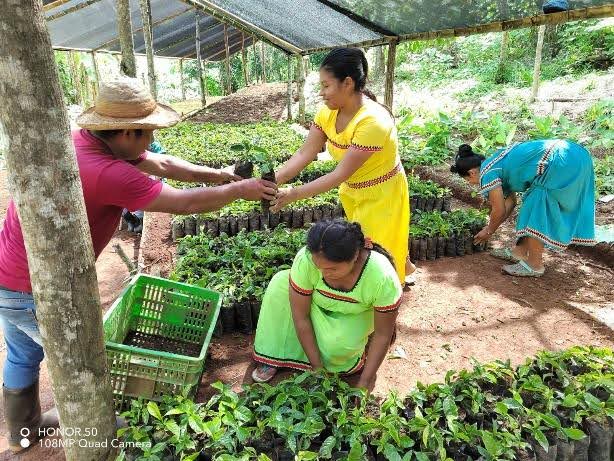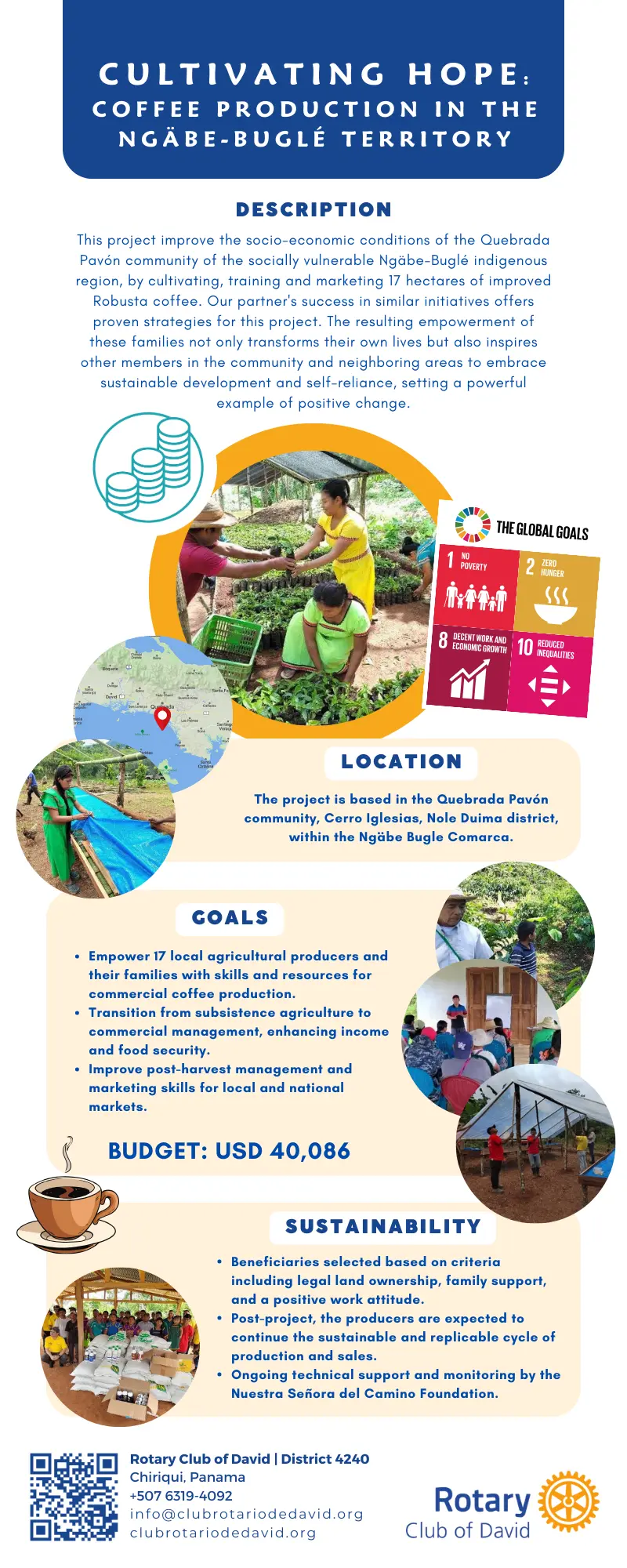Cultivating Hope: Coffee Production in the Ngäbe-Buglé territory
Improving of Socio-Economic Conditions through Robusta Coffee Production in Quebrada Pavón.

Project Overview
This project improve the socio-economic conditions of the Quebrada Pavón community of the socially vulnerable Ngäbe-Buglé indigenous region, by cultivating, training and marketing 17 hectares of improved Robusta coffee.
Our partner’s success in similar initiatives offers proven strategies for this project.
The resulting empowerment of these families not only transforms their own lives but also inspires other members in the community and neighboring areas to embrace sustainable development and self-reliance, setting a powerful example of positive change.
Background
Historically, the Ngäbe Bugle region has alarming poverty and economic vulnerability rates. According to MIDES-UNDP (2020) studies, 55 districts in the Ngäbe Bugle region have high percentages of multidimensional poverty, with nearly the entire population living in poverty in 19 of them. Several factors contribute to this, but the most significant is the limited or non-existent economic development, leading to insufficient and insecure income levels, crucial for meeting basic needs. Despite efforts from the state, private organizations, and national and international non-profits for decades, progress has been limited and often barely noticeable.
Over time, agricultural production methods, post-harvest management, and marketing have improved, enhancing crop yields, product longevity, and pricing. However, this progress does not reflect the reality of Ngäbe Bugle producers. Due to a lack of knowledge and resources, they are limited to subsistence farming, providing only basic food supplies and minimal income. Many migrate for low-paid work outside their territory.
This situation could change if producers and their families had access to training and resources for commercial production, leveraging their land’s potential and geography, thus integrating into the country’s economic development as agents of change within their communities.
Panamanian coffee has gained a strong position in the global market, driving prices upwards. Additionally, the majority of workers in the coffee industry in the province are Ngäbe, many of whom already possess experience in managing coffee production and harvesting. This existing expertise among the local Ngäbe population is a significant asset for the project, aligning with the global reputation of Panamanian coffee and potentially contributing to further market success.
Description
Goals
- Enhance Productive Capacity: Strengthening the technical abilities of coffee producers.
- Improve Post-Harvest Management: Educating producers on commercialization strategies for local and national markets.
- Empower Producers: Developing entrepreneurial skills for sustainable economic growth.
Location
Quebrada Pavón community, Cerro Iglesias area, Nole Duima District, Ngäbe Bugle Region, Panama.
Beneficiaries
The project will directly impact 17 families in Quebrada Pavón, transitioning from subsistence farming to commercial coffee production, enhancing their income and food sovereignty.
Indirectly, the project will benefit the wider community as the success of these families, along with their newfound knowledge and commercial networks, will create synergies that extend to neighboring regions.
This ripple effect can lead to broader economic and social improvements within the community and beyond.
Activities
- Strengthen Technical Capacities for Coffee Production of 100% of Producers:
- Provision of tools, equipment, seeds, fertilizers, and inputs for production.
- Practical training days for nursery preparation and soil conservation.
- Workshops for reinforcement and update in lowland coffee planting and management.
- Monthly technical assistance for each producer.
- Improve Technical Knowledge of Post-Harvest Management for Local and Regional/National Marketing:
- Specialized training on post-harvest coffee management.
- Provision of inputs for drying and storing products.
- Construction of African beds and solar dryers for each producer.
- Establish a Marketing Program to Integrate the Product into the National Market:
- Facilitate coordination, dialogue, and production and sales agreements between producers and buyers.
- Establish at least one coffee purchase and sale contract.
- Specialized training on the functioning of national and international markets.
- Strengthen Soft Skills, Administrative, Accounting, and Business Training with an Entrepreneurial Vision:
- Training sessions in soft skills/human development.
- Training sessions in basic administration and accounting.
- Training sessions in marketing with an entrepreneurial vision.
Sustainability Approach
- Ongoing Support: Continued technical assistance post-project to ensure long-term success.
- Economic Empowerment: Enabling producers to engage in profitable coffee production, contributing to a cycle of sustainable development.
Budget
The total budget for the project is USD 40,086, allocated as follows:
- Equipment and Tools: Provision of agricultural tools, seeds, fertilizers, and other necessary inputs.
- Training and Workshops: Costs associated with conducting practical training, workshops, and technical assistance sessions.
- Post-Harvest Management: Investment in post-harvest facilities such as drying and storage equipment.
- Marketing and Commercialization: Expenses related to marketing training and the establishment of market linkages.
- Administrative and Operational Costs: Covers the administrative and operational expenses of managing the project.
Sow the Seeds of Empowerment
And inspire a ripple effect of self-reliance and economic upliftment in the Ngäbe-Buglé region.
Project Partner
Fundación Nuestra Señora del Camino (FNSC) is a non-profit organization committed to human development and equity. They operate in Eastern region of Chiriqui and the Ngäbe-Buglé region, focusing on educational, social, and economic programs.
Background
FNSC was established in response to the dire poverty in the Ngäbe Bugle region, where 91.1% of the population faces socio-economic vulnerability and low quality of life. Despite efforts by the state and various organizations, progress in alleviating these conditions has been minimal.
Initiatives
Founded in 2005 by P. Adonaí Cortés Elisha, S.J., FNSC began as a training center for indigenous populations, focusing on skills for food security and income generation. It has since expanded to include social protection programs for vulnerable groups like pregnant women, the elderly, and youth.
FNSC’s work aligns closely with the goals of our project, making them an ideal partner in efforts to uplift the Ngäbe Bugle community through sustainable agriculture and commercial activities.
